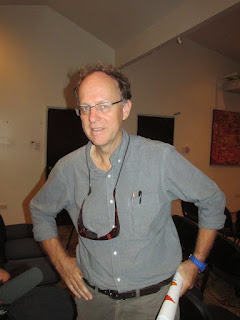Caption: Paul Barker
By MATTHEW VARI
Sunday, January 31, 2016 (Sunday Chronicle, PNG)
IN his response to the 2015 Corruption Perception Index (CPI), Institute of National Affairs Executive Director, Paul Barker, has raised concerns over the lack of complete commitment being shown for various initiatives that have been set up to address the serious issue of corruption in the country.
Mr Barker said that although there are positive steps being taken through mechanisms like the open parliament systems have been steered in the right direction. There still are other areas that need more transparency in terms of public information dissemination.
“As we know in other areas the transparency and the accountability of the whole tendering process we’ve had what appears to be very large overpriced contracts going through to the highest bidders and contracts seem to be awarded even without going through proper tender processes as well,” Barker said.
“We have been adopting various things light the EITI, where we are still a candidate member but hopefully we will get approved membership with the EITI.”
“We have the open governance initiative but these are all the joining stages, we haven’t demonstrated a commitment to the open governance.”
He made reference to the visit by Indonesian Civil Society and how they were participants in the open governance partnership.
“Now in Indoneisa you can look up on a website their members of parliament and look up the president what his salary is, what his assets are.”
“At the moment we just have that sort of system where the information is sent just to the Ombudsman Commission as the leaders returns, but it is just kept discreet by the Ombudsman and no doubt they do some checking on it but really it should be public information that should be presented to parliament and formally made available to the nation and be able to be verifies in the media and by the public and by other offices like the tax office.”
“So if leaders, whether they are bureaucrats or political leaders, seem to have a lot more assets than can be explained by their salaries and they should be picked with enquiries, prosecutions, tax bills, and so on.”
“So there are some positive but we know things like establishing the ICAC (Independent Commission Against Corruption), it has always been something that has been promised.”
He referred to resources in addressing corruption, including for the potential ICAC and the Task Force Sweep have sometimes been allocated but have not been forthcoming.
“We have got a long way to go. We know that we are a developing country and our services and our development indicators remain very poor, education, literacy, health- yet we are a low and medium income country and so we have got a lot more effective and accountable use of the public funds.”
“So now you have a squeezing of the budget because of lower commodity prices and so on it important that we are fully accountable for those funds and we are not diverting them for private use.”
“So when you have a situation like the current drought, those public funds are available for assisting the people of Papua New Guinea to survive even in the worst of times, yet we have already had reports, for example funds, using the DSIP for assistance during the drought actually go to those communities that supporters of the local MP rather than going to those in need.”
“These are all different forms of abuse of power and they also show a lack of feeling for the real needs and interests of the people of Papua New Guinea.” he said.

No comments:
Post a Comment